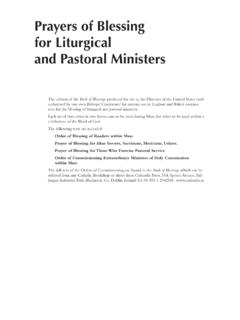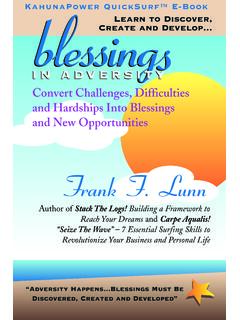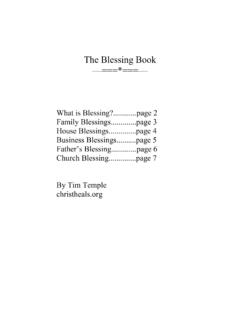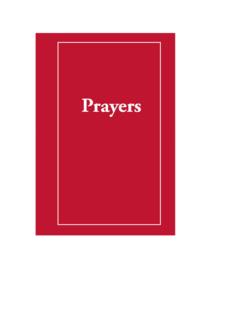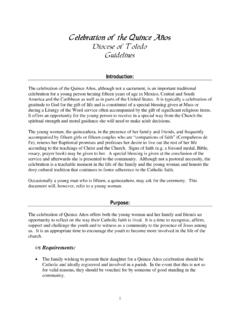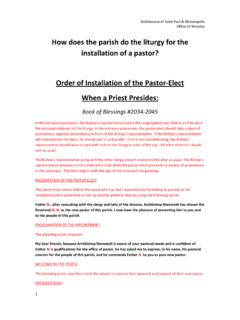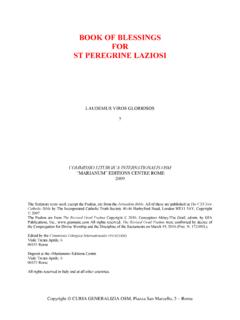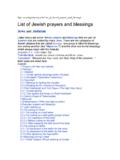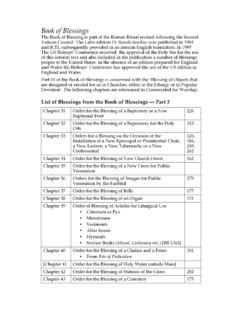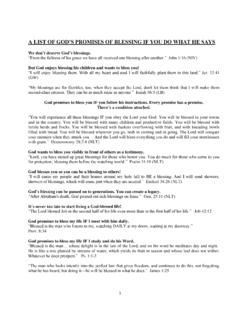Transcription of Blessings of khilafat - Al Islam Online
1 Blessings of khilafat (An English rendering of Barakat-e- khilafat ) Blessings of khilafat (An English rendering of Barakat-e- khilafat ) by Hadrat Khalifatul-Masih II, Mirza Bashirud-Din Mahmud Ahmad (may Allah be pleased with him) Addresses Delivered During the Annual Convention of 1914 Blessings of Khilaaaafat An English rendering of: Barakat-e- khilafat Translated from Urdu into English by: Ahmad Mustansir Qamar First English translation published in UK: 2013 Islam International Publications Ltd. Published by: Islam International Publications Ltd. Islamabad, Sheephatch Lane Tilford, Surrey GU10 2AQ United Kingdom Printed in UK at: Raqeem Press Islamabad, Tilford, Surrey For further information you may visit ISBN: 978-1-84880-088-5 About The Author Hadrat Musleh-e-Mau ud, Mirza Bashirud-Din Mahmud Ahmadra was the Promised Son and the second Khalifah of the Promised Messiahas, the Holy Founder of the Ahmadiyya Muslim Community.
2 Born in accordance with a mighty prophecy of the Promised Messiahas, he was gifted with knowledge, both secular and divine. His understanding of the Holy Quran and Islamic matters was immense. He wrote a detailed commentary covering several chapters of the Holy Quran. His books and lectures are replete with points of wisdom and understanding. He was the prince of exposition both in writing and speech. He was filled with the light Divine. In 1914, at the age of 25, he was elected as Khalifah, that is, successor, to the Promised Messiahas. For 52 years he led the Community and served the causes for which it was established. He inspired and motivated his followers spiritual development; he spoke and wrote in defence of Islam ; and he established institutions to propagate Islam all over the world.
3 Contents About The Author .. v Publisher s Note .. ix Introduction .. xiii First Speech: Blessings of Khilaaaafat .. 1 Importance of Using Appropriate Terminology and Etiquettes .. 3 Heavy Burden of khilafat .. 5 Functions of khilafat .. 9 Misunderstandings About khilafat .. 10 Resemblance with Earlier Khilafats .. 13 Pertinent Incidents .. 20 Dire Consequences of Abandoning the Robe of khilafat .. 27 Has khilafat Assumed a Hereditary Characteristic? .. 29 Path of Reconciliation .. 33 Further Heavenly Testimonies About Impending Issues of khilafat .. 47 Important Issues Facing the Jama at .. 68 Politics .. 70 Marriage between Ahmadis and non-Ahmadis and Issue of Kufw .. 92 Prayer in Congregation ..114 viii Blessings of khilafat Zakat.
4 117 The Life History of the Promised Messiahas ..122 Other Important Issues ..124 Second Speech: Objects of Human Life .. 133 Importance of the Subject ..134 Attaining Nearness to Allah ..138 Beauty and Grandeur of Allah and His Kingdom ..144 No Associate with God ..156 Perform Good Deeds with Noble Intentions ..158 Objective of Islam ..165 Stages of Spiritual Development ..166 Seven Ranks of Spiritual Development ..167 A Misunderstanding ..181 Glossary .. 187 Index .. 193 Publisher s Note According to our system of counting Quranic verses, the verse Bismillahhir-Rahmanir-Rahim (In the name of Allah, the Most Gracious, Ever Merciful) is counted as the first verse of the chapter, which it precedes. Some publishers of the Holy Quran however, begin counting following Bismillahhir-Rahmanir-Rahim.
5 Should the reader not find the relevant verse under the number mentioned in this book , he or she is advised to deduct 1 from the number. For example, if this book quotes Ch. 35: al-Fatir: 25, then some copies of the Holy Quran will list the same verse under Ch. 35: al-Fatir: 24. Where necessary, translation of the Arabic text has been elaborated by additional words to explain the meaning. Such words are not in italics. The word and at the commencement of a translated verse has been omitted. The form ibn has been used in both initial and medial position in the names of persons, in order to conform to current usage, although bin also occurs medially in some original texts (abbreviated usually as b.). Quotations from the Holy Bible are from the King James Translation.
6 X Blessings of khilafat The name of Muhammadsa, the Holy Prophet of Islam , has been followed by the symbol sa, which is an abbreviation for the prayer () sallallahu alaihi wasallam (may peace and Blessings of Allah be upon him). The names of other Prophetsas and messengers are followed by the symbol as, an abbreviation for (/) alaihissalam/ alaihimussalam (on whom be peace). The actual prayers have not generally been set out in full, but they should nevertheless, be understood as being repeated in full in each case. The symbol ra is used with the name of the Companions of the Holy Prophetsa and those of the Promised Messiahas. It stands for (//) radi allahu anhu/ anha/ anhum (may Allah be pleased with him/with her/with them). rh stands for () rahimahullahu ta ala (may Allah s blessing be on him).
7 Aa stands for ( ) ayyadahullahu ta ala binasrihil-aziz (may Allah, the Almighty help him). In transliterating Arabic words we have followed the following system adopted by the Royal Asiatic Society: at the beginning of a word, pronounced as a, i, u preceded by a very slight aspiration, like h in the English word honour. th, pronounced like th in the English word thing. h, a guttural aspirate, stronger than h. kh, pronounced like the Scotch ch in loch. dh, pronounced like the English th in that. s, strongly articulated s. d, similar to the English th in this. t, strongly articulated palatal t. z, strongly articulated z. Publisher s Note xi , a strong guttural, the pronunciation of which must be learnt by the ear.
8 Gh, a sound approached very nearly in the r grasseye in French, and in the German r. It requires the muscles of the throat to be in the gargling position whilst pronouncing it. q, a deep guttural k sound. , a sort of catch in the voice. Short vowels are represented by: a for (like u in bud) i for (like i in bid) u for (like oo in wood) Long vowels by: a for or (like a in father); i for or (like ee in deep); u for (like oo in root); Other: ai for (like i in site)1; au for (resembling ou in sound) Please note that in transliterated words the letter e is to be pronounced as in prey which rhymes with day; however the pronunciation is flat without the element of English diphthong. If in Urdu and Persian words e is lengthened a bit more, it is 1 In Arabic words like (Shaikh) there is an element of diphthong which is missing when the word is pronounced in Urdu.
9 Xii Blessings of khilafat transliterated as ei to be pronounced as ei in feign without the element of diphthong. Thus is transliterated as kei. For the nasal sound of n we have used the symbol n. Thus the Urdu word is transliterated as The consonants not included in the above list have the same phonetic value as in the principal languages of Europe. We have not transliterated Arabic words which have become part of English language, , Islam , Mahdi, Quran3, Hijra, Ramadan, hadith, ulema, umma, sunna, kafir, pukka, etc. Curved commas are used in the system of transliteration, for , for . Commas as punctuation marks are used according to the normal usage. Similarly, normal usage is followed for the apostrophe. 2 These transliterations are not included in the system of transliteration by The Royal Asiatic Society.
10 3 Concise Oxford Dictionary records Quran in three forms Quran, Quran and Koran. Introduction We are honoured to publish the first English rendering of the speeches delivered by Hadrat Khalifatul-Masih II Mirza Bashirud-Din Mahmud Ahmadra at Jalsah Salanah [Annual Convention], Qadian, in December, 1914, soon after he had been appointed by Allah the Almighty to the august office of Khalifatul-Masih. It was a time when the Jama at [Community] faced serious challenges. After the demise of Hadrat Maulana Nurud-Dinra, the first Khalifah of the Promised Messiahas, efforts to undermine the institution of khilafat gained momentum under the leadership of Maulavi Muhammad Ali and Khawaja Kamalud-Din, once counted among distinguished companions of the Promised Messiahas.




